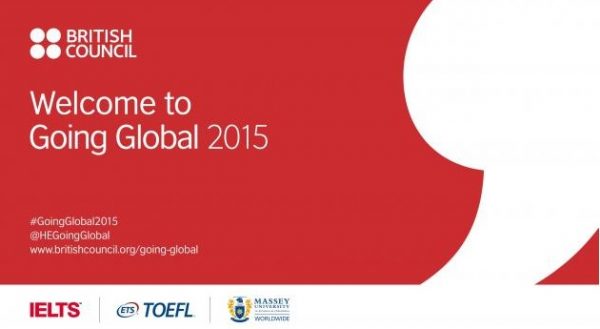Going Global 2015
2 June 2015
On 1 June I attended Going Global 2015, which is the British Council’s high-profile annual conference, attracting higher education delegates from all over the world. I spoke myself at a session on how UK universities can maintain their values while internationalizing, essentially saying that just as at home, we must always keep our charitable object (the creation and dissemination of knowledge for the benefit of all) at the forefront. If we do that both at home and abroad – whilst being highly aware of any particular ethical challenges that international work might entail – we will indeed succeed as a global university. I also took part in meetings with delegations from Iran, India and Indonesia which indicated a real interest in engaging with the UK on their part despite in some cases quite formidable political obstacles. A highlight was the first public speech from the new Minister for Universities and Science, Jo Johnson. Anybody expecting (rather unfairly of course) parallels with his brother Boris would have been disappointed, because his delivery was rather flat and for the most part clearly read from a script prepared by civil servants. The most confident ministers will put their own stamp on a speech and to be fair it was personalized to a degree. Mr Johnson explained his commitment to study abroad by reminding us that he had studied for postgraduate qualifications in Brussels and Paris, and this, coupled with the time he subsequently spent working in Europe, augurs well for our campaign to keep Britain in the EU. He was also for a period The Times newspaper’s New Delhi correspondent, and I understand that he means to make India the destination of his first ministerial trip abroad this autumn. Like many universities we at Cardiff are very keen to build our relationships there and so this commitment too is welcome. Otherwise there were no great surprises or new policies. No announcement was made about the ring fence for research funding that has been in place since 2010, or of the new government’s stance on home fees. The Minister did not mention net migration but repeated the existing line that the brightest and best will be welcomed and that there is no cap on student visas. The government apparently intends to maintain its aim of increasing education export income from £18bn to £30bn by 2020, but there was nothing on the apparent contradiction between this and some elements of the government’s policy on visas as implemented by the Home Office. He did announce that there would be an expansion of the Chevening scholarship scheme which is good news. So a mixed bag in all; but it’s good to have a Minister for Universities and Science who understands the importance of Europe (and of study abroad), is an internationalist and has the ear of the Prime Minister, having been at the heart of policy formation in number 10. We’ll see how it pans out but this is a thoughtful appointment for which I think we can be grateful.
- April 2024
- February 2024
- January 2024
- December 2023
- November 2023
- October 2023
- September 2023
- August 2023
- July 2023
- June 2023
- May 2023
- April 2023
- March 2023
- February 2023
- January 2023
- December 2022
- November 2022
- October 2022
- September 2022
- August 2022
- July 2022
- June 2022
- May 2022
- April 2022
- March 2022
- February 2022
- January 2022
- December 2021
- November 2021
- October 2021
- September 2021
- August 2021
- July 2021
- June 2021
- May 2021
- April 2021
- March 2021
- February 2021
- January 2021
- December 2020
- November 2020
- October 2020
- September 2020
- August 2020
- July 2020
- June 2020
- May 2020
- April 2020
- March 2020
- February 2020
- January 2020
- December 2019
- November 2019
- October 2019
- September 2019
- August 2019
- July 2019
- May 2019
- April 2019
- March 2019
- February 2019
- January 2019
- December 2018
- November 2018
- September 2018
- July 2018
- June 2018
- May 2018
- April 2018
- March 2018
- February 2018
- January 2018
- December 2017
- November 2017
- October 2017
- September 2017
- August 2017
- July 2017
- June 2017
- May 2017
- April 2017
- March 2017
- February 2017
- January 2017
- December 2016
- November 2016
- October 2016
- September 2016
- August 2016
- July 2016
- June 2016
- May 2016
- April 2016
- March 2016
- February 2016
- January 2016
- December 2015
- November 2015
- October 2015
- September 2015
- August 2015
- July 2015
- June 2015
- May 2015
- April 2015
- March 2015
- February 2015
- January 2015
- December 2014
- November 2014
- October 2014
- September 2014